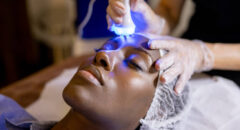
There is nothing like having an itchy scalp especially when you just got a fresh sew-in from your beautician. Trust me, you would not see me doing that crazy head pat out in public nor in private. Whether you are a naturalista or someone who likes to relax, color, or wear weaves up her tresses having an itchy scalp, flakes, inflammation or dandruff can be rough and embarrassing if you don’t get a handle on what is going on with your body.
Dandruff vs Psoriasis
Did you know that nearly 56 percent of people who have psoriasis also have scalp psoriasis? The National Psoriasis Foundation says psoriasis affects more than 3% of the US population which is equivalent to 7.5 million people. Psoriasis can be quite tricky to identify because most people have mistaken it for dandruff leading this skin condition to be left improperly treated.
So I know you are wondering what is psoriasis and how do I know the difference between it and dandruff? Well, psoriasis is an immune-mediated disease that causes inflammation within the body. When the immune system becomes overactive it causes the skin cells to speed up in growth and pile up on the surface of the skin. With normal skin cells, they grow and shed slowly over a month but with skin psoriasis the overactive immune system causes this process to occur in a matter of three to four days.
Because the overgrowth skin cells pile up on the skin, psoriasis would appear fine scaling and white like dandruff but psoriasis has a powdery look with a silvery sheen. Seborrheic dermatitis can also resemble psoriasis but it has a yellowish and greasy look which is similar to cradle cap within infants.
Scalp psoriasis can appear in unusual areas on your body such as, in your scalp, on your eyelids, genitals, lips, hands, feet, nails, hairline, back of your ears and neck and along your forehead. The symptoms of psoriasis can begin at any age and affect any gender but it also impacts many people of color.
The cause of psoriasis is still unknown at this time, but scientists say the immune system and genetics play a part in its development. Stress is stated to be a trigger for psoriasis in some people, but this skin condition can vary from person to person. Other possible triggers for psoriasis are injuries to the skin; such as sunburn, bug bites, anything that can affect the immune system, humidity, cold weather, and vaccinations.
If you think you may have scalp psoriasis make sure you schedule an appointment with a rheumatologist or dermatologist because your symptoms may be an indicator for psoriatic arthritis.
The good news is psoriasis is not contagious and there are many treatment options available to those who are living with this skin condition. Although it may be difficult to treat because many people react differently to various treatment options but hopefully our list of over-the-counter treatment options can provide you with much-needed relief.
Several studies indicate that patients with mild scalp psoriasis should consider looking for over-the-counter solutions that have coal, wood tar and salicylic acid as active ingredients which would help manage their condition.
If you opt for topical solutions, this could present a challenge for women who like to use certain hair products along their edges and if you are prone to wear wigs and weaves. If you have a flare-up, these hairstyles would possibly get in the way of your treatment options if the directions require you to wash your hair several times a week.
Yes, ladies, it's not the norm for most black women to wash their hair multiple times in a week but topical treatments, medicated shampoos, topical steroids, and prescription topicals could dampen your latest hair trend. Just think of it like this, would you rather have a healthy scalp or flakes and inflammation?
Phototherapy is also another treatment option in which ultraviolet light is used to slow excessive skin cell growth. This can come as a handheld device built into a comb that you can use to glide through your hair.
If you have tried one option and it did not work, consider using a combination of treatments to see which one your body would respond to better. In some cases, oral treatments in addition to adjusting to your method of hair and body products could do the trick. There are many products that have earned the NPF Seal of Recognition as safe products for those living with psoriatic disease. Here are a few from the list in which The National Psoriasis Foundation suggests:
- CeraVe Psoriasis Skin Therapy Moisturizing Cream
- Curél® Hydra Therapy Itch Defense
- Gold Bond: Multi-Symptom Psoriasis Relief Cream
- TriDerma Psoriasis Control Cream
- Abundant Natural Health Ocean Soothe Lotion
- Atoderm Cream
- Bodewell’s Super Cream
I also found that using pure shea butter also helps alleviate some of the inflammation and itching which is usually accompanied by psoriasis, but the only drawback from this product is it's slightly greasy and could stain your clothes and it increases your body temperature making you a little hot after it's been applied to the skin. Greasiness, humidity and sweltering summers are not a great combination, especially if you live in the South.
Overall, if you find yourself scratching, itching or picking at your scalp, or perhaps see inflammation on your skin, be sure to check in with your doctor to make sure you’re not misdiagnosing yourself with dandruff when you actually have psoriasis.








